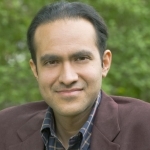 (HOST) Commentator and UVM Professor Saleem Ali has been pondering an underlying common thread between health care reform and the politics of war and peace.
(HOST) Commentator and UVM Professor Saleem Ali has been pondering an underlying common thread between health care reform and the politics of war and peace.
(ALI) Casual conversations these days at social events seem to revolve around two key topics – health and war. We have national and state-wide healthcare reform to consider, and then the ongoing conflicts in Afghanistan and the Middle East as a backdrop to all such discussions.
On the surface, there is little conversational commonality between domestic healthcare and international conflict. Yet, there is a fundamental common issue that haunts these two dominant topics – the value of life. How do we value an individual life in monetary terms? Do we make differentiations between a life at home and a life abroad? Do we care more about a life that was born to fortune versus one that either was born to or met misfortune without its own volition?
These questions are often so troubling and difficult to wrestle with that we shy away from them. We obfuscate the conversation with blame games and tangential arguments. Consider, for example, the recent series of aspersions which the U.S. government has been casting on Pakistan for being somehow complicit with the Taliban. Absent from the U.S. media’s obsession with this story has been a discussion of how many Pakistani civilians and military officials have lost their lives in the war on terror. More than 31,000 Pakistanis have been killed in terrorist attacks since 9/11, which is 10 times the number of U.S. casualties in the same period. Euphemisms such as collateral damage can often trivialize the salience of these numbers, but the pain for the grieving mother or father or spouse or child is no less poignant.
With healthcare reform, the conversation often moves towards grand theories of individual choice, rather than considering that the poor have little luxury of "choice" when they fall sick. Are their lives any less valuable that we should let them fall through the cracks? A Harvard Medical School study in 2009 found that annually more than 45,000 deaths are due to lack of health insurance among those who cannot afford coverage. This is more than the deaths for natural disease categories such as kidney failure. Are their lives any less valuable that we sacrifice them to preserve the individual choice of those who can actually afford to buy insurance?
Our friends in the insurance, legal and economic sectors are perhaps most quantitatively tuned in to the value of life and the compensation that needs to be offered for wrongful death cases. This varies enormously across countries, but also across the various accident categories and classes. Why are we not having a societal conversation about these discrepancies? To be a truly humane society we need to engage in these most difficult discussions about how to value our most precious and vital force – the gift of life.